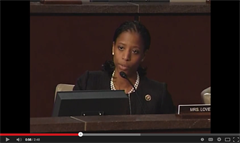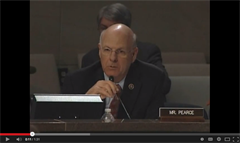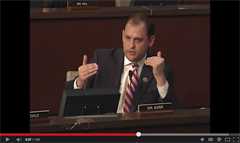During yesterday’s hearing with the secretary of Housing and Urban Development, members of the Financial Services Committee continually raised concerns that misguided Washington policies are hurting taxpayers and homebuyers by putting them into homes they can’t afford to keep. The Federal Housing Administration (FHA) is today using many of the same practices employed by subprime lenders at the height of the mortgage crisis in the run up to the Great Recession. Taxpayers have already been forced to pay nearly $200 billion to bailout Fannie Mae, Freddie Mac and the FHA.
 |
| CLICK HERE TO WATCH REP. MIA LOVE (R-UT) |
"What I’m trying to say is this is not just a fiscal issue for me. This is a moral issue. This is about us taking people and bringing them to the lowest common denominator. What happened to the values of homes when people default on homes? What do these neighborhoods start to look like? What do you say to the people who have gotten into homes responsibly and all of a sudden -- because of so many different foreclosures around that area -- realize that their neighborhoods are going into decay, that they’ve lost the value in their home? What do you say to those people?”
“The last thing I want to bring up is a map that was sent here by our ranking member, that was introduced, and this shows distressed neighborhoods from 2008 to 2012. And the only thing I want to leave you with is that the people who run these areas have the same political view as you do. In the words of the president during the State of the Union address, ‘if it’s not working, it’s time to do something different.’ We need to do everything we can by not just worrying about one family, but worrying about as many people as possible.”
 |
| CLICK HERE TO WATCH REP. STEVE PEARCE (R-NM) |
“I participated in my first year in making an award from some department in HUD that allowed a young woman to move into a home in Anthony, New Mexico. Anthony is predominantly a poor community so it was nice to have the help there. Several years later she caught me at a town hall and said, ‘Do you remember coming to my house? You actually helped move boxes out of the trucks.’ I said, ‘I do remember that.’ She said, ‘I was sort of led into that by this free money from the government.’ She said, ‘What I did was I put my money down, I bought a house that I could not afford because I just wanted to believe that I could do it.’ She said, ‘I ended up losing the whole thing. Everything I owned went with it.’ That’s what we do in the sense of fairness. That’s what we do when we do not have adequate underwriting standards, when we don’t bother to take a look at if people can make the payments or if they can’t.”
“People in New Mexico are relatively ambivalent about the whole concept of GSEs and the problems that the GSEs caused until I explain that you the taxpayer is getting to pay for the bad mortgages for your neighbor down the street, whether they made it or they were enticed into it or whether the government helped them -- doesn’t matter. If it goes bad, you the taxpayer are paying for their mortgage and yours. That’s when people get hostile.”
 |
| CLICK HERE TO WATCH REP. ANDY BARR (R-KY) |
“Your underwriting would promote loans that another federal agency would deem risky. It’s a double standard. Let me just continue on the idea of this double standard. You talk about the non-compliance with the capital reserve ratio congressional mandate that you’re below 2% and that you are working hard to come into compliance. My question would be -- for a community bank that’s not meeting the Basel requirements of 6%, would a federal regulator and examiner conducting an exam of the bank, how would a federal regulator look at that community bank if the bank’s excuse was ‘we are working hard to come to compliance?’ Would the regulator excuse that kind of response in an exam of that bank?”